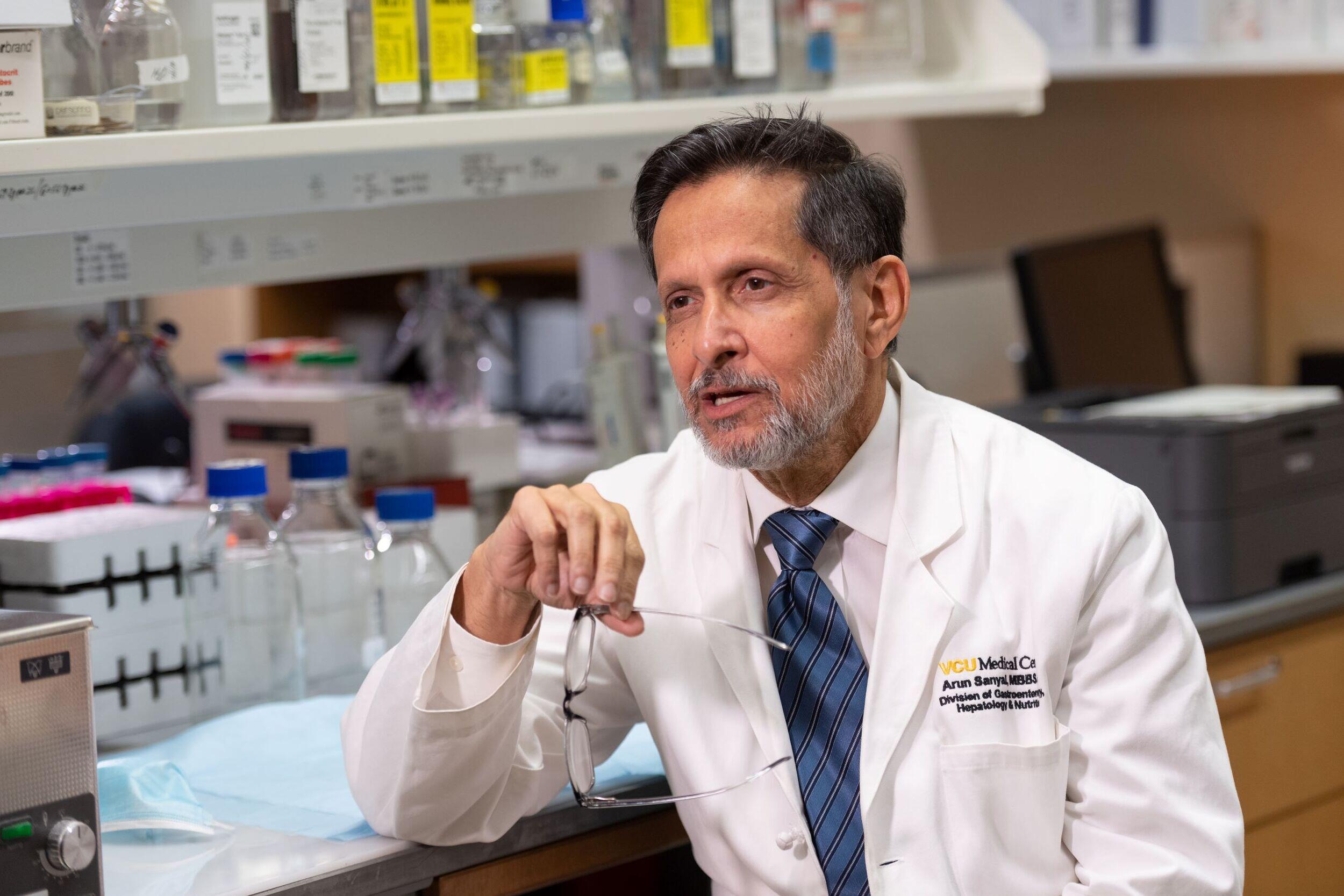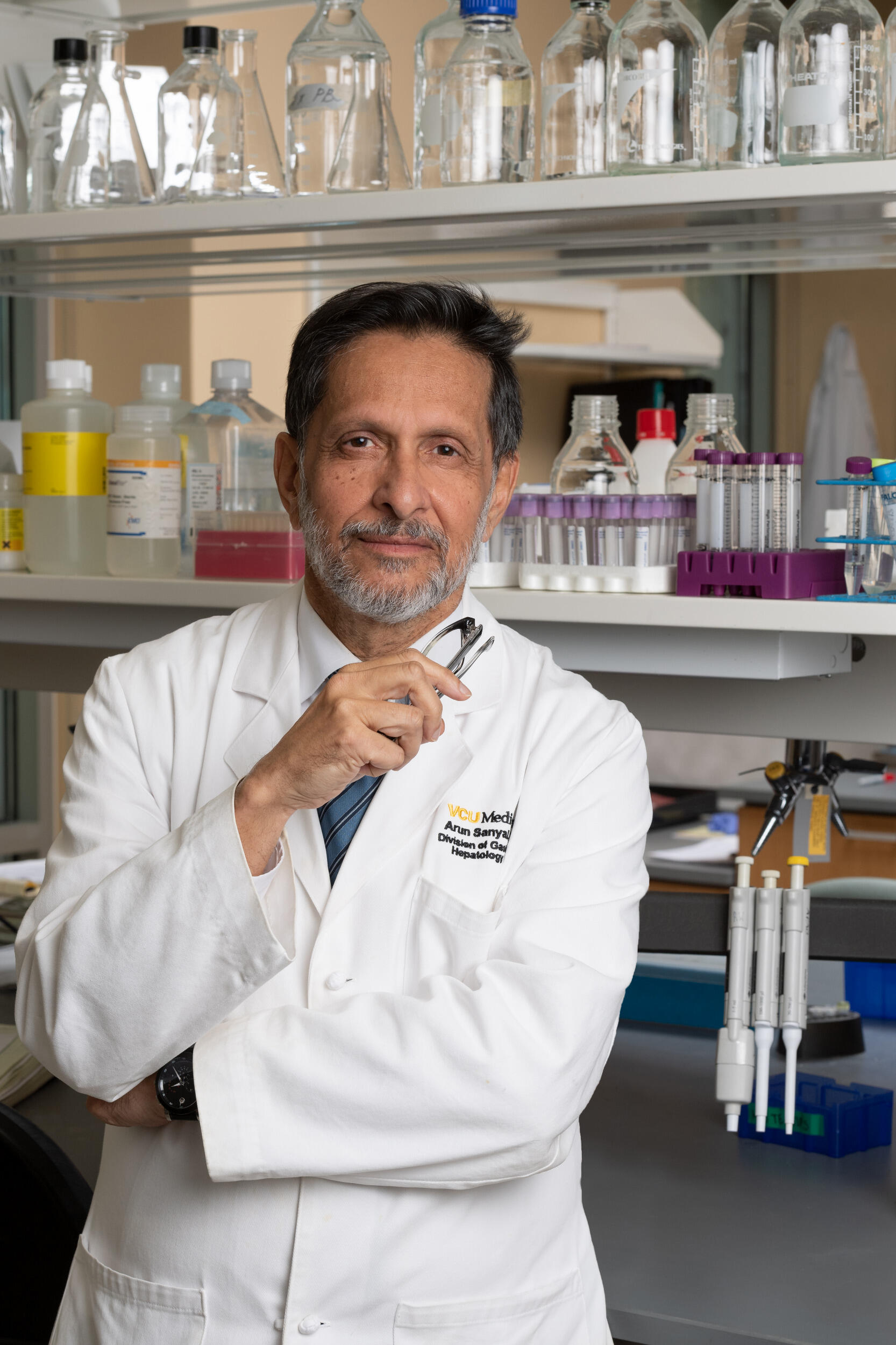
Feb. 15, 2022
Arun Sanyal is determined to transform the lives of people with liver disease around the world
Share this story
Arun J. Sanyal, M.D., was getting ready for his fellowship interview at VCU Medical Center in the winter of 1987 when he slipped down the stairs of his hotel in the snow and was covered with mud. With no time to change, he considered canceling the interview. Fortunately, he decided to keep his appointment.
“It was amazing chemistry from day one. I knew this is where I wanted to go,” said Sanyal, who is now director of the Stravitz-Sanyal Institute for Liver Disease and Metabolic Health. “I was always comfortable here at VCU. It has been my professional home ever since.”
A faculty member in the Department of Internal Medicine in the VCU School of Medicine since 1989, Sanyal is internationally known for his work in the development of therapeutics for reducing liver disease around the globe. He has won multiple national awards, such as the 2018 Distinguished Achievement Award from the American Association for the Study of Liver Diseases.
Sanyal also founded the Liver Forum, which brings the U.S. Food and Drug Administration and European Medicines Agency together with academics and industry to facilitate drug development.
A life dedicated to medicine
Growing up in New Delhi, India, Sanyal knew at an early age that he wanted a career in medicine. For years, he watched his father, a physician and scientist, dedicate his life to service and family.
“I was born 10 years after India became independent. My father was very much involved in the first generation of physicians to set up the health care system in India. That played an important role in who I am,” Sanyal said, adding he has always wanted to give back to the community at large, like his father.
When it came time for Sanyal to choose a location for his fellowship after medical school, he made the most transformational decision of his life — to move to the United States.
“Moving to a new country [brings] a lot of different challenges,” he said, noting his deep connection to his homeland.
“I discussed it with my father at length. The ability to do science is unparalleled when you look at the U.S. versus any other part of the world. Also, the ability to translate the science into better cures and treatments that can affect the life of patients around the world is better exponentially in the U.S. than other parts of the world,” he said.
When he was training in India, he was fascinated by three areas of medicine — cardiology, nephrology and gastroenterology. When he came to the U.S. and began exploring options for his fellowship, he realized there was much more diversity in digestive health sciences than in other specialties.
“That is what made my initial decision to move into gastroenterology and hepatology,” he said.
Making an impact on the world
Sanyal didn’t begin to focus on liver disease until his early days as a faculty member at VCU School of Medicine. He credits that new direction to a group of mentors that included the late Z. Reno Vlahcevic, M.D., former chair of VCU’s Division of Gastroenterology. Today, Sanyal holds the Z. Reno Vlahcevic Research Professorship in Gastroenterology Research.
“Dr. Vlahcevic steered me in the direction of the liver. He was an important career mentor, along with Professor Edward Moore who taught me how to think scientifically and Professor Gabriel Makhlouf who helped me refine my academic skills to be successful. He saw things that I didn’t see at the time,” said Sanyal, who is now a professor and interim chair in the Division of Gastroenterology, Hepatology and Nutrition in the Department of Internal Medicine. “He told me to really work on the liver and focus on a liver-oriented path. Now, 30-some years later, I know that was good advice.”

Mentorship is at the crux of the new liver institute, Sanyal said. He serves as associate director of KL2 Career Development and Mentoring at VCU’s C. Kenneth and Dianne Wright Center for Clinical and Translational Research.
“It’s about having a place where you have mentors that not only teach you medical facts, reasoning, procedures and how to think about things, but also actually guide your life path and show you where and how you need to proceed,” he said. “One thing we want to do is create a mindset that becomes an enduring part of how we train the next generation of investigators and create an environment where people thrive and feel that they are bringing value to themselves, science and patients.”
The institute will concentrate on generating science that will impact the world.
“The heart of this is the ability to transform the lives of people with liver disease around the world,” Sanyal said. “With every new finding, you can impact a million people. That’s what makes research so powerful.”
A longtime friend and colleague of Sanyal’s, R. Todd Stravitz, M.D., whose donation has fast-tracked Sanyal’s vision for the liver institute, has faith in Sanyal’s ability to lead the institute, which builds on the longstanding success of the faculty and staff who work in the Hepatology Division. Over three decades, Stravitz, the former medical director for liver transplant at VCU Health who recently retired as a longtime faculty member at VCU School of Medicine, has worked alongside Sanyal on numerous research projects related to the liver.
“Dr. Sanyal is going to ensure the third generation [of liver specialists] is successful and really makes VCU the No. 1 liver center in the world,” Stravitz said.
Promoting a greater understanding of liver disease and metabolic health
Sanyal is aware that many people don’t understand how the liver affects a person’s overall health.
“It plays a central role,” said Sanyal, also a researcher at VCU Massey Cancer Center. “The importance of the liver is not just restricted to liver disease. It has a halo effect on overall health in areas such as diabetes, cardiovascular disease, cancers, etc. The impact [of the institute] is going to be much broader beyond the liver.”
Over 50% of people with diabetes have excess fat in the liver, he said.
“Most of them don’t even know that they have it. The process unfolds over many years,” he said. “One of the goals of our liver institute is to expand our ability to take care of people who have diabetes here in Virginia and be able to identify those who not only have that fatty liver disease, but also have enough disease that they are actually at risk of dying from their liver disease.”
There’s a popular perception that liver disease only occurs in people who consume a lot of alcohol or use drugs. But that’s not true, he said.
“There are many other causes of liver disease from genetic conditions that are linked to diabetes, cardiovascular disease, obesity, etc. There’s drug-induced liver disease,” he said. “There are liver diseases that result from the activity of the immune system like psoriasis. So there’s a whole slew of liver diseases that have nothing to do with how a person behaves.”
One of the institute’s goals is to expand education about liver disease.
“We will be able to work in Virginia to destigmatize liver disease and also highlight the close link between liver disease, diabetes, cardiovascular disease, cancers, addictions and so forth,” he said.
The need for scientific rigor
Sanyal understands the impact the institute can have with the right resources in place. When he was growing up in India, resources for research were limited. He remembers how his father used some of his salary to keep his research moving forward.
“We lived simply. My mother would say, ‘What your father is doing is helping a lot of people,’” Sanyal said. “My parents didn’t have to do that. It’s just something they did. There are a few formative moments like that that shape your thinking and what you want to do.”
By watching his father, Sanyal also realized that you must constantly explore how you can solve problems, he said.
“There was and is a need for scientific rigor,” he said. “All of these things I learned and acquired, consciously and unconsciously.”
When he was in medical school, Sanyal didn’t realize the level of satisfaction he would feel about his work and the ability he would have to impact life at a higher level.
“That was unimaginable,” he said. “It is the biggest gift I could have received. That’s what makes this whole thing worthwhile for me.”
When Sanyal looks in the mirror, he would like to see a reflection of his parents and what they have taught him, he said.
“It would be a combination of the intellectual rigor of my father, his toughness and strictness, with the kindness of my mother, one of the most gentle people I have met in this world,” he said. “I’m very fortunate for the parents I have. What makes me feel the best is that I did something that reflects the best parts of my parents."
Subscribe to VCU News
Subscribe to VCU News at newsletter.vcu.edu and receive a selection of stories, videos, photos, news clips and event listings in your inbox.










